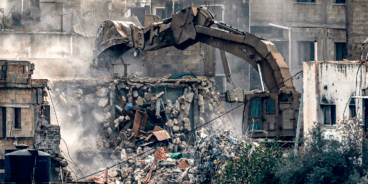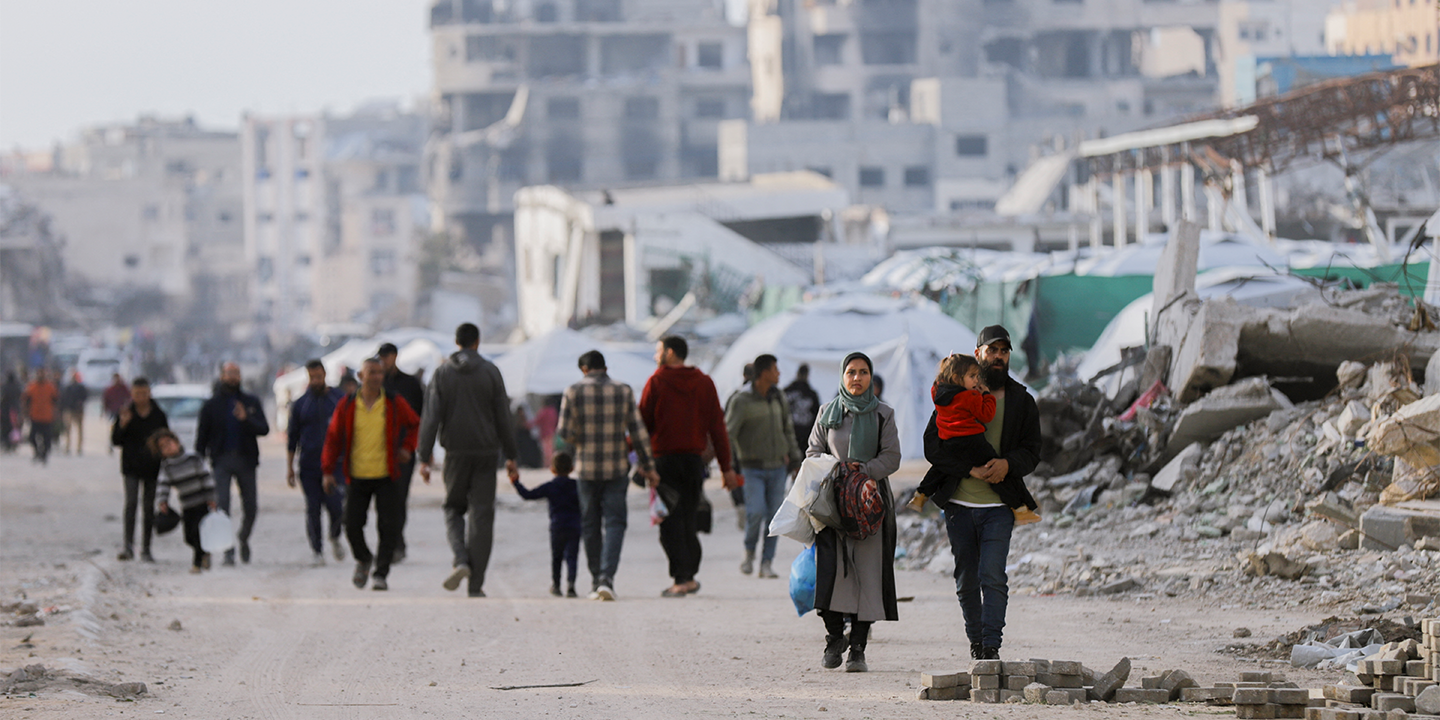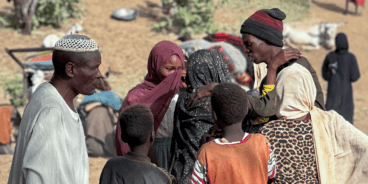

Atrocity Alert No. 433: Israel and the Occupied Palestinian Territory, Myanmar (Burma) and Mali
Atrocity Alert is a weekly publication by the Global Centre for the Responsibility to Protect highlighting situations where populations are at risk of, or are enduring, mass atrocity crimes.
ISRAEL’S CONDUCT IN GAZA BEARS HALLMARKS OF ATROCITIES, WARNS UN
Since ending the ceasefire on 18 March and launching a new large-scale military assault on Gaza, Israel has subjected Palestinians in the besieged enclave to a renewed wave of atrocities, killing over 1,000 Palestinians. According to the UN Children’s Fund, at least 322 of those killed were children. On 28 March Jens Laerke, Deputy Spokesperson for the UN Office for the Coordination of Humanitarian Affairs (OCHA), stressed, “the acts of war that we see bear the hallmarks of atrocity crimes,” adding that “nothing can justify the collective punishment of the Palestinian people.”
Israel’s resumption of hostilities in Gaza has followed well-established patterns of unlawful conduct, including indiscriminate attacks, mass forced displacement, destruction of civilian infrastructure and obstruction of life-saving aid. Over 140,000 Palestinians have already been forcibly displaced after Israel issued displacement orders across at least 15 percent of Gaza’s territory, according to OCHA. On 31 March Israel issued new displacement orders covering almost the entirety of Rafah in southern Gaza. On 23 March – two days after the UN Human Rights Office in the Occupied Palestinian Territory warned against the commission of war crimes through “any measures constituting forcible transfer” – Israel’s security cabinet approved a proposal to establish an agency tasked with facilitating the “voluntary transfer” of Palestinians in Gaza to third countries.
Meanwhile, Israel’s systematic attacks on the humanitarian and health sectors have intensified. Since 18 March Israeli forces have destroyed Gaza’s only specialized cancer hospital, targeted the surgical ward of the largest hospital in the south, damaged an office of the International Committee of the Red Cross and struck a UN compound, compelling the UN to scale back its operations. On 31 March Tom Fletcher, UN Under-Secretary-General for Humanitarian Affairs and Emergency Relief Coordinator, demanded “justice and answers” after the bodies of over a dozen first responders, killed by Israeli forces, were found in a mass grave in Rafah.
For over a month, Gaza has been under total siege after Israel halted the entry of all humanitarian aid and commercial supplies. The World Food Programme warned that it has only enough food to continue operations for at most two weeks, while all 25 bakeries supported by the agency have already been forced to shut down. On 27 March Israel’s Supreme Court unanimously rejected a petition filed a year ago, which demanded Israel ensure the unimpeded provision of humanitarian aid throughout Gaza. The court dismissed Israel’s positive obligations as an occupying power to ensure the provision of aid and declined to rule on Israel’s current policy of completely halting aid entry.
States with influence must urgently intervene to assist in reinstating the ceasefire. Israel must immediately halt its military assault, lift the siege, provide security guarantees to aid agencies and repeal displacement orders. UN member states must take immediate steps to hold Israeli authorities accountable, including by halting arms transfers, imposing targeted sanctions and refraining from recognizing or providing any assistance to Israel’s unlawful occupation. States must adhere to their obligations to employ all means at their disposal to prevent genocide.
MYANMAR JUNTA LAUNCHED AIRSTRIKES IN THE AFTERMATH OF DEADLY EARTHQUAKES
On 28 March a powerful series of earthquakes struck central Myanmar (Burma), killing at least 2,900 people, injuring thousands more and causing widespread destruction. The World Health Organization reported that an estimated 10,000 buildings have collapsed in northwestern Myanmar. In the aftermath, many areas have been left without power or telecommunications, and roads and bridges have been damaged. Rescue efforts continue as workers search for victims trapped under the rubble.
Despite the urgency of the situation, Myanmar’s military junta has continued its bombing campaign in severely affected areas. Less than three hours after the earthquake struck, a junta airstrike killed at least seven people in Naungcho, northern Shan State. The UN Special Rapporteur on the situation of human rights in Myanmar, Tom Andrews, said it was “completely outrageous and unacceptable” that the junta was continuing to “drop bombs when you are trying to rescue people.”
While the major cities impacted by the earthquake are under junta control, vast areas of the country affected by the disaster are either controlled by ethnic resistance organizations (EROs) or remain contested. Since October 2023 EROs and other groups have taken control of significant portions of territory from the junta. In response, the junta has intensified its use of scorched earth tactics and airstrikes targeting civilian areas. The Airstrike Report for Myanmar documented 2,155 junta airstrikes across 12 regions of Myanmar from June to December 2024 alone. Amid the ongoing conflict, the junta has systematically denied or blocked humanitarian aid to civilians, particularly to areas controlled by EROs.
Before the earthquake, Myanmar’s humanitarian situation had already been dire, compounded by the military coup in February 2021. In 2025 nearly 20 million people across Myanmar need assistance. During relief efforts responding to previous natural disasters, the military intentionally delayed and obstructed aid from reaching victims and imprisoned local aid workers. Reports from doctors and other first responders at the epicenter of the earthquake reveal that much of the aid meant for victims has been confiscated by the junta, while humanitarian workers have faced access restrictions.
Targeted and indiscriminate airstrikes on civilian areas, attacks on first responders and humanitarian workers, as well as blocking humanitarian aid are prohibited under international law and may amount to war crimes.
On 29 March the government in exile, known as the National Unity Government, declared a unilateral ceasefire for affiliated EROs, with the exception of defensive actions. Days later, on 2 April the junta announced a ceasefire lasting until 22 April. The Global Centre for the Responsibility to Protect’s Myanmar expert, Sarah Hunter, said, “We welcome the ceasefire announcements across Myanmar and urge all parties to ensure aid workers can continue their critical efforts to save lives without fear of attack. All groups must also allow and facilitate rapid and unrestricted humanitarian access, while the international community should support local partners in reaching those most in need.”
THREE YEARS ON, NO JUSTICE FOR VICTIMS OF THE MOURA MASSACRE IN MALI
Three years ago, during a joint operation from 27 to 31 March, the Malian Armed Forces (FAMa) and Wagner Group mercenaries perpetrated the worst single atrocity in Moura, resulting in the highest civilian death toll since conflict in Mali began in 2012. According to a report published in 2023 by the Office of the UN High Commissioner for Human Rights (OHCHR), FAMa and mercenaries killed over 500 people – the majority summarily executed – and raped or committed other forms of sexual violence against at least 58 women and girls. Soldiers reportedly searched house-to-house for “presumed terrorists” and several dozen people were also arrested and tortured. Summary executions, rape and torture amount to war crimes and could amount to crimes against humanity.
Moura, located in the Mopti region, has been the epicenter of conflict and atrocities in Mali for a decade. An al-Qaeda-affiliated group, Katiba Macina, has long operated in the region, and the offensive in Moura was part of a broader effort to target alleged fighters and curtail the spread of the group. While OHCHR acknowledges that around 30 combatants from Katiba Macina were present in Moura, their presence does not justify the extrajudicial executions, rapes and looting.
OHCHR’s report was a crucial step in establishing the truth about the atrocities committed in Moura and should contribute to the victims’ right to justice. Despite a military court announcing the opening of an investigation in April 2022, there have been no arrests or significant investigative action since. Malian authorities have condemned the report and denied any wrongdoing.
In a new report presented to the UN Human Rights Council, the Independent Expert on the human rights situation in Mali made the connection between the lack of accountability for incidents like the one in Moura to ongoing risks today stressing that, “The escalation of serious human rights violations and abuses by all actors is accelerating due to impunity.” The Independent Expert condemned the “regime of terror” imposed by armed Islamist groups through sieges, killings, kidnappings and sexual violence. Meanwhile, FAMa and mercenaries continue to commit extrajudicial executions, destroy civilian property and conduct indiscriminate airstrikes, leading to numerous civilian casualties. The Malian military authorities have also perpetrated violent reprisals against civilians who denounce abuses and unlawful killings of civilians.
Addressing the lack of accountability is crucial, as it has emboldened perpetrators to commit further abuses. The Malian authorities, in collaboration with the Independent Expert, must conduct thorough and independent investigations into all allegations, make the findings public and hold those responsible accountable. The International Criminal Court should continue its investigations and prosecutions of perpetrators of serious crimes, particularly those committed in central Mali over the past decade.
Related Content


Atrocity Alert No. 435: Sudan, Israel and the Occupied Palestinian Territory and Democratic Republic of the Congo
